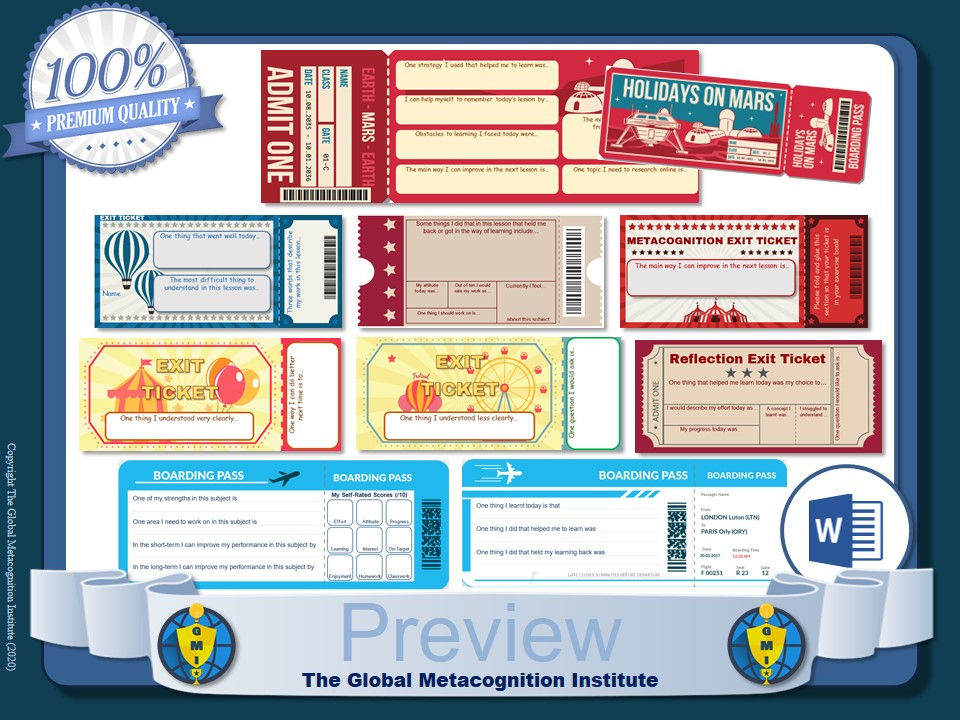Metacognition is the awareness and understanding of thought itself; metacognitive approaches to teaching and learning focus on the planning, monitoring, evaluation and regulation of thinking processes. Recently, the definition of metacognition has been broadened and includes not only ‘thoughts about thoughts’ as it was previously considered, but the following notions as well: knowledge of one’s knowledge, processes, and cognitive and affective states; and the ability to consciously and deliberately monitor and regulate one’s knowledge, processes, and cognitive and affective states (Louca, 2003). “Cognitive strategies are used to help an individual achieve a particular goal (e.g., understanding a text) while metacognitive strategies are used to ensure that the goal has been reached (e.g., quizzing oneself to evaluate one's understanding of that text). Metacognitive experiences usually precede or follow a cognitive activity. They often occur when cognitions fail, such as the recognition that one did not understand what one just read.” (Livingston, 1977).
Metacognition can be explained as individuals’ use of information while they are learning or fulfilling a task and a deliberate organisation in cognitive processes (Brown, Bransford, Ferrara & Campione, 1983) whilst Wilson (1998) regards metacognition as knowledge and awareness of thinking processes and strategies (together with the ability to evaluate and organise these processes). In ‘How People Learn, the National Academy of Sciences’ synthesis of decades of research on the science of learning, one of the three key findings of this work is the effectiveness of a “‘metacognitive’ approach to instruction” (Bransford, Brown, & Cocking, 2000, p. 18).
Music is not only an enjoyable form of art, but it can also help foster metacognition in students. Metacognition is the process of thinking about one's own thinking, and it can be applied to any subject area, including music education. Music teachers can use a variety of strategies to help students develop metacognitive skills, which can enhance their musical abilities and overall learning. Here are some ways music teachers can foster metacognition in their students:
Encourage self-reflection: Music teachers can encourage students to reflect on their own musical performances and identify areas for improvement. For example, after a performance, teachers can ask students to think about what went well and what they could have done differently.
Provide opportunities for self-assessment: Teachers can provide students with rubrics or checklists to help them assess their own musical skills and progress. This can help students become more aware of their strengths and weaknesses and set goals for improvement.
Teach students to set goals: Music teachers can teach students how to set SMART (Specific, Measurable, Achievable, Relevant, Time-bound) goals for their musical development. This can help students focus their practice and achieve measurable progress.
Encourage critical thinking: Music teachers can ask students to analyze musical pieces and performances, encouraging them to think critically about the music they are playing or listening to. This can help students develop their analytical skills and deepen their understanding of musical concepts.
Use metacognitive prompts: Teachers can use metacognitive prompts, such as "What am I doing?", "What do I know?", "What do I need to know?", and "How can I get there?" to help students become more aware of their thinking process and develop problem-solving skills.
Practice mindfulness: Music teachers can teach students mindfulness techniques to help them become more focused and attentive during rehearsals and performances. Mindfulness practices can also help students become more aware of their thoughts and emotions, which can enhance their metacognitive abilities.
Encourage collaboration: Music teachers can encourage students to work together in groups or ensembles to develop their musical skills and learn from each other. This can also help students become more aware of their own strengths and weaknesses and develop metacognitive skills.
Provide constructive feedback: Teachers can provide students with constructive feedback that helps them understand their strengths and areas for improvement. Feedback can also help students become more aware of their thinking process and develop self-regulation skills.
Encourage students to ask questions: Teachers can encourage students to ask questions about musical concepts, pieces, and performances. This can help students become more curious and engaged in their musical learning and develop critical thinking skills.
In conclusion, music teachers can use a variety of strategies to foster metacognition in their students. By encouraging self-reflection, providing opportunities for self-assessment, teaching goal-setting, encouraging critical thinking, using metacognitive prompts, practicing mindfulness, encouraging collaboration, providing constructive feedback, and encouraging students to ask questions, music teachers can help students become more aware of their thinking process and develop their metacognitive skills, which can enhance their musical abilities and overall learning.
References
Bransford, John D., Brown Ann L., and Cocking Rodney R. (2000). How people learn: Brain, mind, experience, and school. Washington, D.C.: National Academy Press.
Brown, A. L., Bransford, J. D., Ferrara, R. A. and Campione, J. C. (1983). “Learning, Remembering, and Understanding”. In P. H. Mussen (Ed.). Handbook of Child Psychology (pp.77-166). New York: John Wiley.
Louca, Eleonora. (2003). The concept and instruction of metacognition. Teacher Development.
Livingston, Jennifer A. (1977), Metacognition: An Overview
Wilson, J. (1998). Assessing Metacognition: Legitimizing Metacognition as a Teaching Goal. Reflect, 4(1), 14-20.
















































Comentários